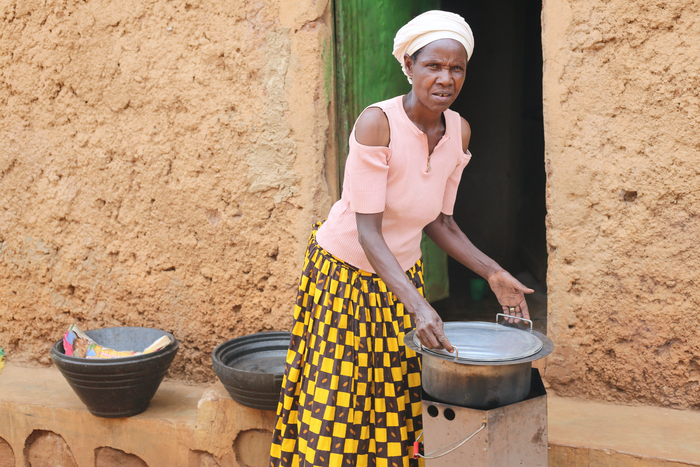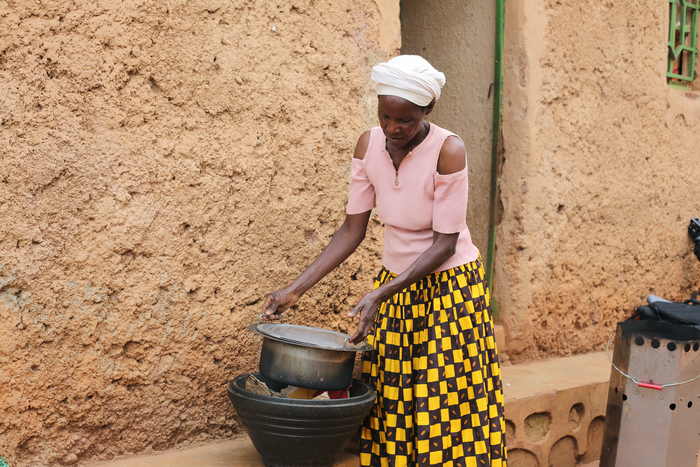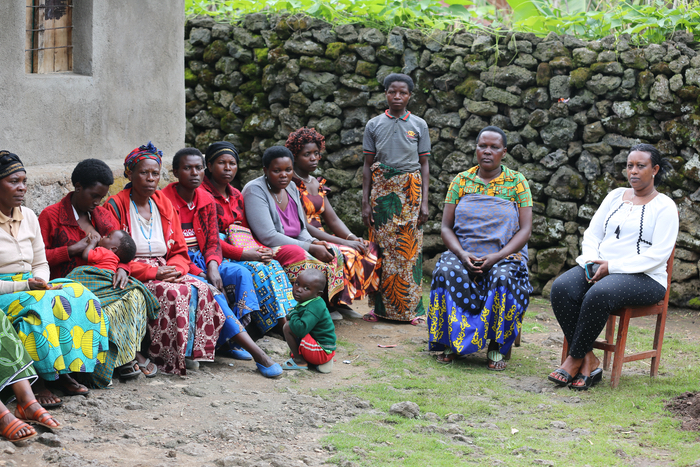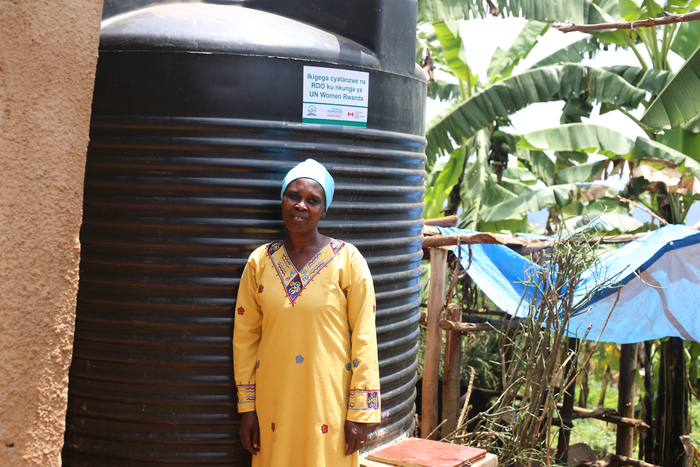
By Steven Nsamaza;
Kigali: As day breaks, Jacqueline Mukasano wakes up her five school going children to prepare them for a new school day. When everyone has washed and dressed she serves food from the previous night cook before they set off.
Mukasano from Kigabiro village in Ndera sector of Gasabo District serves food from her heat retention wonderbox, a sort of food flask locally known as ‘runonko’ that keeps food warm for over 12 hours.
When everyone has finished breakfast, the children set off for school and the mother goes to the farm to start her day’s work.
Mukasano, 55, has various chores during the day including preparing meals for the family, cleaning, farm work, looking after the cow and other small home errands.
Collecting firewood and cooking which used to take most of her time have been made easier since she got an energy efficient steel cook stove, sauce pans and runonko.

Jacqueline Mukasano preparing meals for the family
The energy efficient kits were donated to rural women under the 3R project implemented by Rwanda Development Organisation (RDO) with support from UN Women. The project aims at introducing transformative approaches to Recognize, Reduce and Redistribute (3R) unpaid care work.
According to Diana Mugwaneza, the Programs Officer of RDO, women’s empowerment is one of the programs undertaken by RDO to uplift women across the country.
Mugwaneza said that through a study commissioned by UN Women Rwanda found that a big number of women in Rwanda spend a lot of time doing household work, which is unpaid care work.
The findings from eight districts show that on average women work for around 4.1 hours per day compared to men with approximately 1.7 hours on unpaid care and domestic work. This is particularly in those areas with limited access to regular basic services such as energy, water, and sanitation.
The study also points at finding firewood and cooking as one of the major burdens faced by rural women. Thus, a response at reducing time towards this limitation can ensure that women work to their full potential.

Diana Mugwaneza (Left in white blouse), the Programs Officer of RDO visiting women in Muramira, Kimonyi Sector in Musanze District
“Through financial support from UN Women, we implemented a project intended to reduce the burden faced by rural women in unpaid care work,” notes Mugwaneza.
We started by training couples, showing them the work in question as a way to enlighten them to analyse what is involved with an aim that women and men can share unpaid care work, explains Mugwaneza.
Esperance Uzamukunda, from Kimonyi Sector in Musanze District, one of the beneficiaries of the project underscores that many of them never realized the time and energy they put in unpaid care work.
“We never knew we did any important work and thought we were unproductive because we never brought in cash,” Uzamukunda says, adding that the project opened their eyes towards the important work for the family.
RDO was again able to distribute efficient energy kits to over 400 households and 120 water tanks in Gasabo, Muhanga and Musanze Districts.
The efficient energy kits and water tanks have been invaluable to the beneficiaries especially women that received them. The time they normally spend doing domestic work has been reduced significantly that many are both benefiting in terms of saving time and money.
For Mukasano, the energy-saving stove and food flask she received have changed her lifestyle, given her advanced age she was starting to fail in some work like cooking beans or posho that sometimes required more strength she couldn’t afford.
“I would collect firewood for over 3 hours, cook beans for another 3 hours and sometimes they are undercooked. Today with the new cook stoke it takes me 30 minutes with 3 small pieces of wood to cook beans,” Mukasano testifies.
The mother of nine said, taking care of her five school going children became easier since she was given the stove and runonko.
She says that the family now eats well cooked and warm food anytime unlike before.
“My children now eat warm food every morning before they go to school and no longer do I take a lot of time to prepare meals – it’s a matter of minutes not hours like before,” underlines Mukasano.
Mukasano says that cooking is no longer a burden as well as collecting firewood because only a few pieces are needed which are either collected by her children in a matter of minutes when not at school which can last for a week or longer.
Melisa Murekeyisoni, the chairperson of Twitezimbere-Mukuyu cooperative which has some members that were beneficiaries of the energy efficient stoves and water tanks including Mukasano, underscore the change rural women are now undergoing.

Melisa Murekeyisoni, the chairperson of Twitezimbere-Mukuyu cooperative in Mukuyu, Ndera Sector in Gasabo District
Murekeyisoni revealed that one of the families that used to have domestic conflicts all changed when they received a water tank. The man used to beat his wife, blaming her that she was useless and doing nothing.
When the family got a water tank, relations improved, the man realized the importance of his wife’s care work as things started improving in their home. Before, he blamed the wife for joining the cooperative and she would spend hours to go fetch water, returning very exhausted and unable to do other thing.
Mukasano joyfully stresses how she is unable to state fully offer her gratitude to the invaluable essentials received. “We are supported and blessed, thank you RDO and UN Women, because you answered my prayers.”
